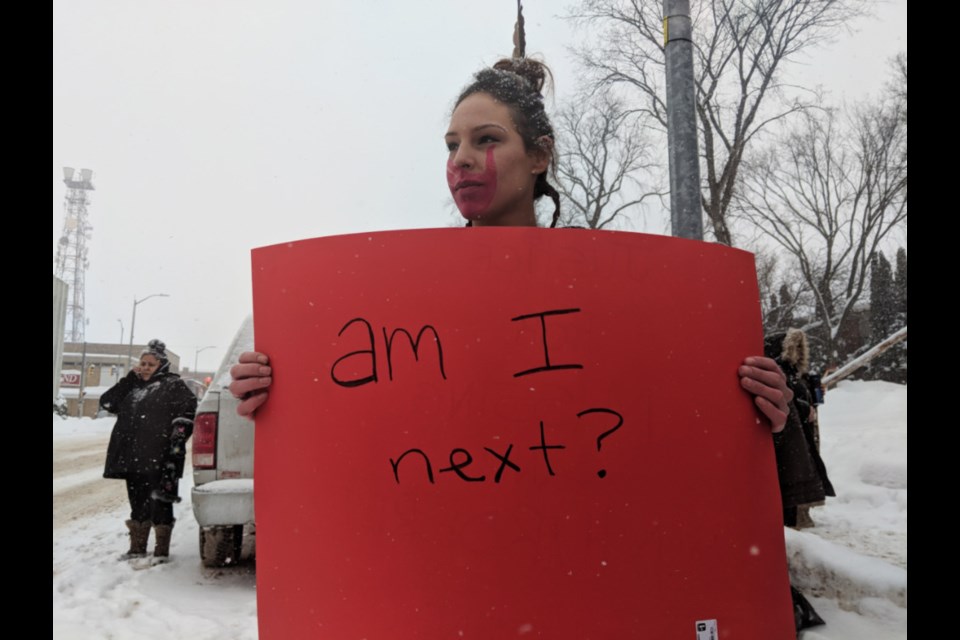Indigenous and non-Indigenous members of the public and elected officials gathered outside the Sault Ste. Marie Courthouse Thursday to mark the 12th annual national rally and march for Missing and Murdered Indigenous Women and Girls (MMIWG).
Participants held up signs lettered with various messages and slogans, one of them asking the chilling question ‘Am I Next?’
“I want to recognize all the missing and murdered Indigenous women and girls. I want to recognize the importance of coming together to remember them and also coming together to find the truth of what occurred. This is not only an historic issue, it is also a current issue, it’s an issue we are dealing with today,” said Sault Mayor Christian Provenzano, addressing the audience.
“I encourage all residents of this community to support this important national event.”
“Our women need to be protected. This cannot continue,” stated Batchewana First Nation Chief Dean Sayers.
“We can’t just do this one day and stop. The federal government’s intentions are great, but we can’t place all our faith in the government in helping us protect our people. We need to take action. I still have some hope in regard to the (federal government’s) Missing and Murdered Indigenous Women and Girls inquiry. It’s been a challenging process all the way through. I hope there will be a really great outcome prior to the federal election in October,” Sayers said.
He added the Sault’s municipal government is “setting the bar for all Canadian communities. I’m looking forward to the day when the rates of missing and murdered Indigenous women are non-existent.”
Speaking to SooToday, Sayers said “there seems to be a two-tiered justice system when it comes to Indigenous people when we are victimized and the perpetrators tend to walk away with really not appropriately aligned sentences or findings and that’s really disappointing to our people...we are working on that, to have an equitable justice system,” adding he would have liked to have seen some international oversight, from such organizations as the United Nations, into Canada’s inquiry into cases of missing and murdered Indigenous women and girls.
“I’ve witnessed many Indigenous women and girls being affected by a lot of terrible things in their lives and my part was to be a support person in their times of need. We are thankful the country has started to recognize a lot of people who were not recognized in the past, the families who are still suffering and worried about their loved ones,” said Sgt. Karen Bell, an Anishinabek Police Service officer based in Garden River First Nation.
Thursday’s annual event included songs and drumming along with speeches at the Courthouse, participants then marching to the Delta for a gathering which included meetings and support services for those troubled by issues facing Indigenous people.
According to the RCMP’s 2015 report, entitled Missing and Murdered Aboriginal Women: A National Operational Overview, 1,017 Indigenous women have been murdered over the past three decades.
174 Indigenous women were missing, and 111 of those cases were under suspicious circumstances, but remain unsolved.
Statistics Canada, in 2011, reported rates of violence against Indigenous women is three times higher than for non-Indigenous women, and seven times higher for homicide rates.
The federal government’s MMIWG inquiry began in 2016, documenting injustices faced by First Nations, Metis and Inuit women, hearing from nearly 1,500 family members over 15 community hearings.
The government’s report is expected in April.
